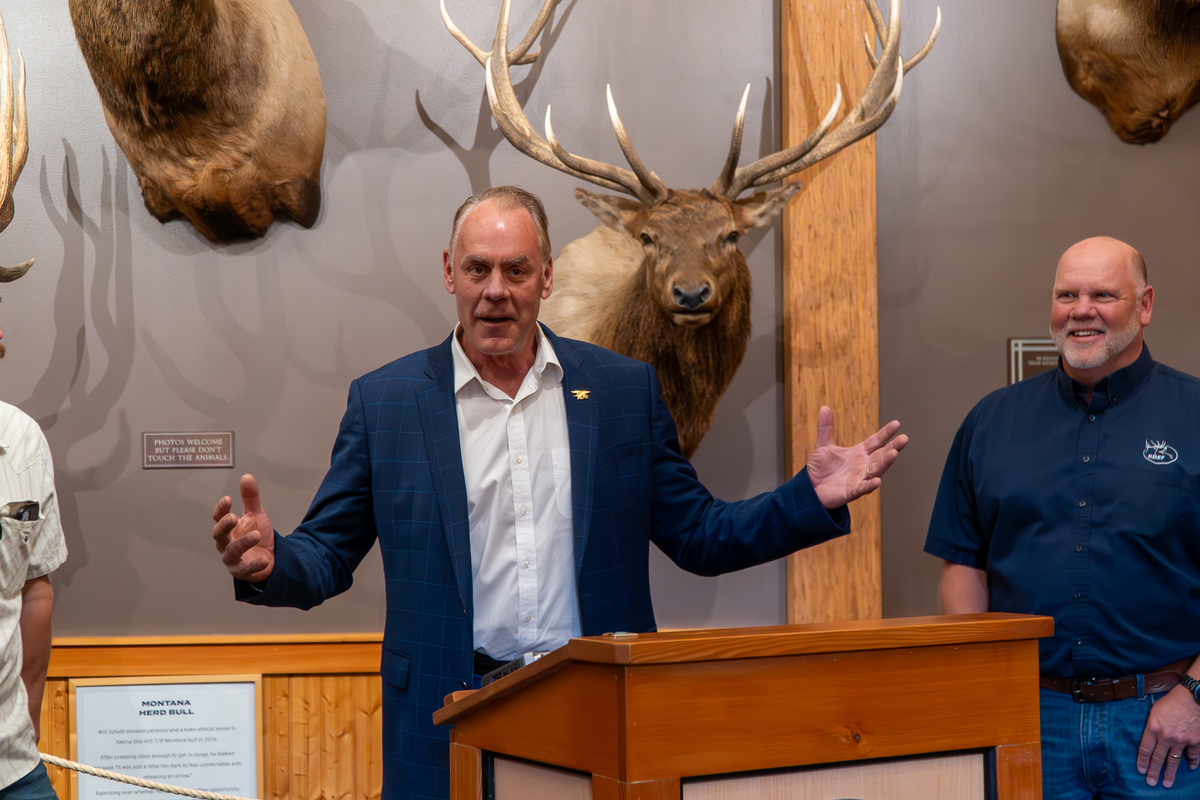(Left to right: Representative Ryan Zinke and RMEF Chief Conservation Officer Blake Henning)
The Rocky Mountain Elk Foundation recently rolled out the red carpet for what it hopes is a national effort to help elk, mule deer and other migrating wildlife species.
Representative Ryan Zinke (R-MT) introduced the Wildlife Movement Through Partnerships Act at RMEF’s headquarters, while Senator Alex Padilla (D-CA) introduced the companion version in the Senate. The legislation builds on Secretarial Order 3362 and would commit federal and state agencies to collaborate and ensure the health and longevity of big game migration corridors and identify critical wintering habitat.
“The Wildlife Movement Through Partnerships Act is directly aligned with the mission of the Rocky Mountain Elk Foundation, and we thank Senator Padilla and Representative Zinke for introducing this bipartisan and bicameral legislation,” said Kyle Weaver, RMEF president and CEO. “RMEF has successfully advocated in Washington DC to prioritize migratory areas through Interior Secretarial Order 3362, the Wildlife Highway Crossings Pilot Program in the Bipartisan Infrastructure Law and USDA’s Migratory Big Game Initiative. Generous contributions by RMEF members and partner organizations have allowed us to make these valuable habitat investments, critical to conserving and improving elk and wildlife habitat. RMEF’s mapping work has accelerated through partnerships with US Geological Survey researchers at the University of Wyoming and partnerships with state wildlife agencies and the federal land management agencies in the Interior and Agriculture Departments.”
Specifically, the bill creates the Wildlife Movement and Migration Corridor Grant Program, establishes the State and Tribal Migration Research Program, adds migration corridors and seasonal habitat conservation efforts as eligible for financial assistance under the Partners for Fish and Wildlife Program, and direct US Geological Survey Cooperative Research Units to map big game corridors and movement areas.
“Wildlife follow the path that has been bred and programmed into them over generations with no understanding of the distinctions between private and public or federal and state land. That’s why collaboration and partnerships are so important when managing migratory species such as pronghorn, bighorn and mule deer,” said Congressman Zinke. “It has been five years since I signed S.O. 3362 and a lot of quality conservation work has been done to promote big game habitat in that time, and now is the time to solidify the intent and purpose of the program to promote public-private partnerships in conservation and focus on migratory big game. I thank Representative Beyer, Senator Padilla, for joining me in this critical effort.”
Big game migratory corridors can cross swaths of both public and private land with obstacles such as fencing, highways, subdivisions and other development, which can block wildlife movement and lead to drastic downturns in big game herd populations.
Representatives of several other conservation and hunting groups attended the announcement.
“Passage of Wildlife Movement Through Partnerships Act will send a clear message that Congress prioritizes big game migration and habitat enhancement now and in the future,” added Weaver.
View the Congressman Zinke news release here.
(Photo credit: Rocky Mountain Elk Foundation)
